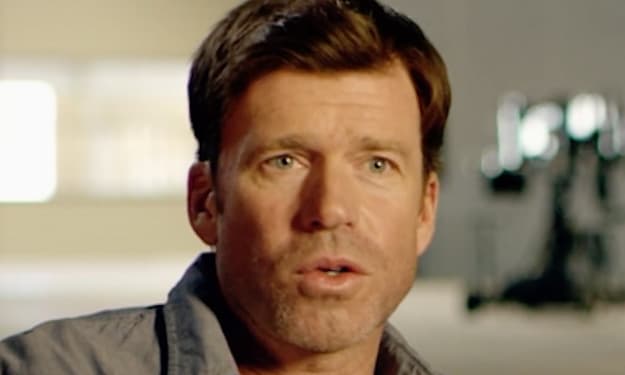Messages to the President
With a series of populist broadsides that were both credo and commerce, the resistance to the Tweeter-in-Chief showed up bigly on Oscars Sunday.

President Donald Trump finally commented on the Oscars, finding his own way to make it all about him: “I think they were focused so hard on politics that they didn’t get the act together at the end,” Trump said in a Monday interview with Breitbart News.
In a way he had a point: From statements made Sunday night on the stage of the Dolby Theater to the content in some commercials broadcast during the ceremony, popular culture (and companies that invoke that culture to sell what they sell) weighed in with a message to the President: Even when you think it’s all about you, it’s about something bigger than you.
Consider the brilliant take on what it means to be a “migrant worker” offered by Mexican actor Gael García Bernal (Mozart in the Jungle, Neruda): “Flesh-and-blood actors are migrant workers; we travel all over the world, we build families, we construct stories, we build life that cannot be divided,” Bernal said on stage, to heartfelt applause. “As a Mexican, as a Latin American, as a migrant worker, as a human being, I’m against any form of wall that wants to separate us.”
◊ ◊ ◊
Then Madison Avenue weighed in. There’s the ad from the Hyatt Hotels chain — part of what the global hotelier (Trump’s competition) calls a new campaign focused on fostering empathy in the countries where its hotels are.
A white Westernized woman sits in a train compartment across from a Muslim woman dressed in the hijab and burka common to those of the faith. The Western woman starts in with nonverbal signs of discomfort. But the Muslim woman leans over to retrieve something the Western woman dropped on the floor ... and returns it to her.
After a few moments, their eyes meet and there’s a moment of commonality — part of the “World of Understanding” that is the tag line for the campaign. The ad also contains other images of cultural collisions happily resolved — all done to the voice of Grammy-nominated singer Andra Day singing Burt Bacharach's 1966 classic, “What the World Needs Now.” It’s a clear shot at Trump’s proposed travel ban of people from seven Muslim-majority nations, and his parallel crackdown on illegal immigrants already in the United States.
◊ ◊ ◊
In an interview, Maryam Banikarim, Hyatt chief marketing officer, told Variety that the concept for the campaign was well fleshed out before the Nov. 8th election. “It really was about understanding and what understanding can afford people,” she said, admitting that the ad is hitting the airwaves “in an interesting cultural moment that will force people to look at this in a different light.”
Audible, the maker of spoken audio entertainment, information, and educational programming, made its presence felt in two quietly powerful ads that used not just the power of celebrity but also the weight of the words of celebrated writers to drive home a timely point.
Claire Danes (Homeland) read a passage from Victor Hugo’s Les Misérables, one that’s an inescapable commentary both on Trumpian xenophobia and on the president’s controversial choice of Betsy DeVos as secretary of education and her appeal for charter schools, intended to be alternatives to public schools. “Society is to blame for not providing free public education, and society will answer for the obscurity it produces," Danes recited. "If the soul is left in darkness, sins will be committed. The guilty party is not the one who has sinned, but he who created the darkness in the first place.”
◊ ◊ ◊
In Audible’s second broadside of the night, Zachary Quinto (Star Trek) read from George Orwell’s 1984, taking swipes at Trump policies related to the Muslim travel ban and the president's America First mindset, invoking the isolationism of the insular, insecure America in the run-up to World War II:
“If he were allowed contact with foreigners, he would discover that they are creatures similar to himself, and that most of what he had been told about them is lies.”
In its first TV ad in years, The New York Times debuted its stark, black-and-white “Truth” ad campaign, a pointed rejoinder to the “fake news” phrase Trump and his acolytes have made a frequent refrain since he became president — often denouncing The Times and other news orgs.
◊ ◊ ◊
Maybe the most effective ad of the evening didn’t manufacture scenarios to communicate tolerance; the Cadillac commercial, part of the carmaker’s “Dare Greatly” campaign, used newsreel footage, classic still photographs and modern videos to get its point across.
In the ad, one man is seen in an apparently recent video, greatly daring to hold up a sign of welcome, a message almost subversive given the current climate: “YOU BELONG. STAY STRONG. BE BLESSED. WE ARE ONE AMERICA.” As of Monday night, the slices-of-life Cadillac commercial had scored more than 2 million views on You Tube.
There’s no escaping the role serious money plays in the advertisements’ place on one of the most frequently-watched TV programs of the year; ABC, the network carrying the Oscars broadcast, charged about $2 million for a 30-second spot, according to Forbes, citing figures from Kantar Media.
◊ ◊ ◊
But the ads and actors’ statements set the backdrop for a groundbreaking night whose winners — including Mahershala Ali, the first Muslim actor to win an Oscar; and Moonlight, an outlier story of coming-of-age as black and gay, winning Best Picture — sent an implicit message of inclusion.
Since before Trump’s inauguration on Jan. 20th, the word “resistance” landed in society with a force and centrality it’s never had before in the United States — invoking some of the power the word had with the French in their fight against Nazi Germany during World War II.
The statements from Bernal and others had their own expected weight. But commercials that debuted on Oscars Sunday, coming after the ads of populist passion that appeared during Super Bowl LI, point to another resistance at work — an admittedly predictable but apparently earnest pushback from corporations with much in common with the cloistered, moneyed class that the Tweeter-in-Chief so thoroughly represents.
About the Creator
Michael Eric Ross
Michael Eric Ross writes from Los Angeles on politics, race, pop culture, and other subjects. His writing has also appeared in TheWrap, Medium, PopMatters, The New York Times, Entertainment Weekly, msnbc.com, Salon, and other publications.






Comments
There are no comments for this story
Be the first to respond and start the conversation.